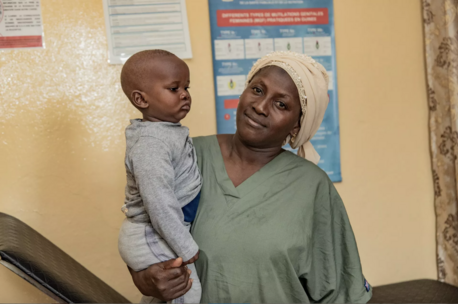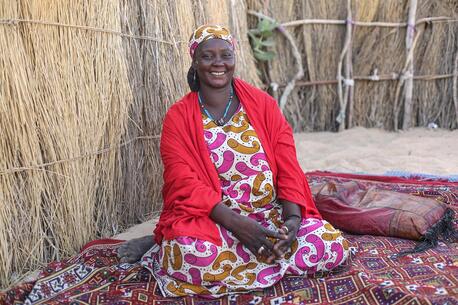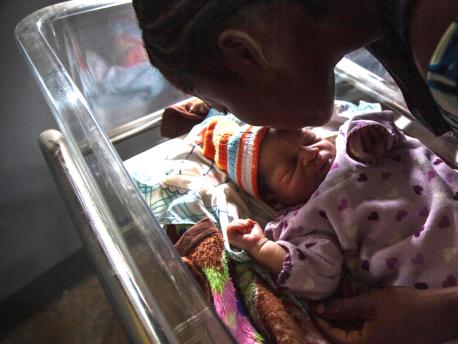
Eliminating Maternal and Neonatal Tetanus in Pakistan
UNICEF and partners are working to prevent maternal and neonatal tetanus (MNT), an excruciating disease that kills tens of thousands of infants every year.
HARIPUT DISTRICT, KHYBER PAKHTUNKHWA: The day begins early in Bharu Kot, a small island in the Haripur district of Khyber Pakhtunkhwa province, Pakistan. As the first rays of dawn touch the sea, fishermen are already busy on the water, taking advantage of the cooler temperature and calmer conditions.
Fishermen, laborers, nomads and seasonal migrants make up the population of a vibrant community that lives on Bharu Kot. Their stories are woven together by shared circumstances. Together, they create a cultural mosaic characterized by continuous movement and adaptation.
Their way of life requires a high degree of adaptability and a profound connection to the environment, with each day shaped by both opportunities and challenges.
Stories of human resilience and adaptability are common here, reflecting the daily lives of ordinary people confronting extraordinary challenges.
One significant challenge faced by the people of Bharu Kot is the lack of health care facilities, adding a layer of vulnerability for the community in such a remote setting.
Babra, 36, lives with her husband and their seven children in Bharu Kot. Currently pregnant, she faces high risks associated with maternal and neonatal tetanus (MNT) due to unsafe birth practices and inadequate health services.
Having lost a baby already because of difficulties in accessing vaccinations and iron supplements, Babra is determined to change her story this time. Now in her second trimester, she feels healthier and more secure, thanks to the care provided by visiting health care professionals.
“Last year, I suffered a miscarriage, but this time, a health care worker has helped me with vaccinations and also provided iron tablets,” says Babra, on the day she is receiving the MNT vaccination from a Lady Health Worker (LHW).

The MNT vaccine protects mothers and their future children at birth
MNT is a fatal disease affecting women and their babies in countries where women often give birth at home outside of hygienic health facilities. However, it is largely preventable through simple measures such as clean labor and delivery environments, proper umbilical cord care and lifesaving vaccinations. A series of three shots provides immunity to a woman and protects her future children at birth. (As they grow, children need routine booster shots to remain protected.)
Tetanus cannot be eradicated — Clostridium tetani, the bacteria that causes tetanus, is commonly found in soil — but it is easily preventable through vaccination. The Maternal and Neonatal Tetanus Elimination (MNTE) initiative was launched in Pakistan by the Government in collaboration with UNICEF in 2022.
Globally, this initiative was launched jointly by UNICEF, WHO and UNFPA in 1999, revitalizing the goal of MNTE as a public health problem. The objective was to reduce neonatal tetanus cases by less than 1 per 1,000 births in every district of the country.
Nazma Shaheen, a health care professional in the Haripur district, talks about the challenges and successes of the campaign. "At the beginning, it was difficult to persuade women in my area about the importance of vaccination," she explains.
Despite facing refusals based on religious beliefs, vaccine fatigue, reluctance and restricted access due to recent floods and security concerns, the efforts have been fruitful: “I persevered and succeeded in vaccinating many women in the community," Shaheen says. "It is gratifying to offer safe, effective and often hard-to-access vaccines to women and children.” With support from The Church of Jesus Christ of Latter-day Saints and Kiwanis International, over 3 million women across Khyber Pakhtunkhwa, including 700 in the Haripur district, have been reached.
“Our day starts before dawn with orientation and briefings to understand each village's specific vaccination needs and obstacles," Shaheen explains, highlighting the dedication of her team of female health workers. “Armed with tally sheets, vaccines and supplies, we tackle the challenges head-on."

MNT has been eliminated in all but 11 countries
Shaheen remains optimistic that ongoing awareness raising about hygienic birth practices and better access to vaccines will significantly reduce the incidence of MNT in Pakistan, one of the 11 countries where the disease persists.
“As a female health worker, I often navigated unsafe routes to reach various communities. Despite these obstacles, we were always warmly welcomed, and families showed a readiness to be vaccinated," says Shaheen. "These interactions have helped us build meaningful relationships, bridging gaps across our diverse communities.”
As the community of Bharu Kot continues to adapt to its changing environment and challenges, Babra's story underscores the importance of the health care initiatives that are transforming lives on the island. Through the dedicated efforts of health care workers and the support of global partnerships, there is renewed optimism for a healthier future for these remote communities.
This story was originally published on unicef.org
HOW TO HELP
There are many ways to make a difference
War, famine, poverty, natural disasters — threats to the world's children keep coming. But UNICEF won't stop working to keep children healthy and safe.
UNICEF works in over 190 countries and territories — more places than any other children's organization. UNICEF has the world's largest humanitarian warehouse and, when disaster strikes, can get supplies almost anywhere within 72 hours. Constantly innovating, always advocating for a better world for children, UNICEF works to ensure that every child can grow up healthy, educated, protected and respected.
Would you like to help give all children the opportunity to reach their full potential? There are many ways to get involved.





